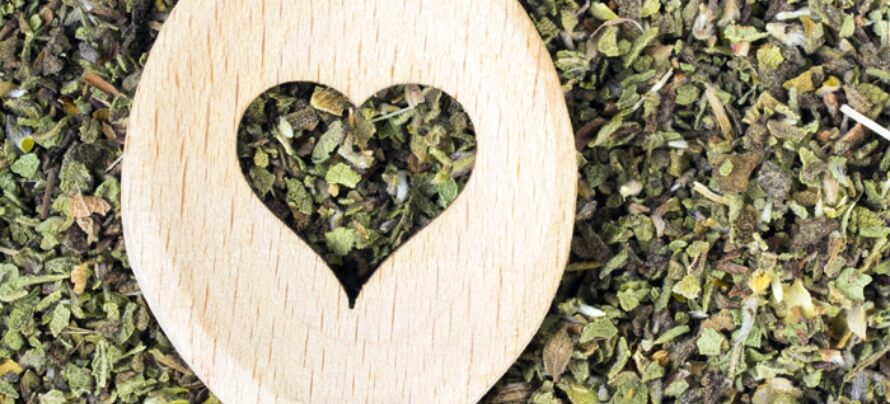Key Takeaways
- Green tea contains antioxidants, which fight free radicals and reduce oxidative damage.
- Green tea may reduce cancer and diabetes risk, protect against cognitive decline, and improve heart health.
- While green tea can increase fat burning, it’s not quite as effective as many people claim. Read on to learn more!
While only gaining mainstream popularity in the West in the last two decades, green tea has been enjoyed for thousands of years in China and other parts of Asia as a healing drink.
Green tea is made from the Camellia sinensis plant by steaming or roasting the leaves quickly after picking, and then drying them.
It’s the least oxidized form of tea since it’s processed without withering, bruising, or purposely being oxidized.
The fact that it’s exposed to minimal oxygen after harvesting means that green tea is rich in catechins (some of the most powerful and beneficial antioxidants around) most notably epigallocatechin gallate (EGCG), which is a potent destroyer of free-radicals in the body.
Let’s take a deeper look at some of the research on green tea and see if it lives up to the hype.
- Green Tea May Lower Cancer Risk
- Green Tea Promotes Better Brain Health
- Green Tea May Reduce Your Risk of Type 2 Diabetes
- Green Tea May Improve Cardiovascular Health
- Green Tea Boosts Energy & Endurance
- Green Tea Can Help You Lose Body Fat
- The Bottom Line on the Health Benefits of Green Tea
Table of Contents
+Green Tea May Lower Cancer Risk

Green tea contains antioxidants that can help protect our bodies against oxidative damage (the damage of cells due to oxygen reacting with free radicals).
This oxidative damage is involved in the development of many diseases, including cancer.
Antioxidants help prevent cellular damage by keeping free radicals under control.
Many studies have looked at green tea as a means of lowering the risk of different types of cancers including those of the colon, liver, breast, bladder, stomach, prostate and pancreas.
While more studies are needed, right now there are some very promising results:
- A study of almost 70,000 women found an association between regular consumption of green tea and less instances of colorectal cancer. Other studies have shown the same trend.
- Green tea is associated with a decreased risk of advanced prostate cancer, based on a study of almost 50,000 men over a period of 11 to 14 years.
- The Mayo Clinic has stated green tea extract has shown promise in treating chronic lymphocytic leukemia.
- A study of over 8,500 Japanese people for 9 years found drinking green tea significantly reduced incidences of cancer, especially among females drinking more than 10 cups a day.
- A meta-analysis conducted by scientists at the Harvard School of Public Health found an inverse association between green tea consumption and the recurrence of breast cancer.
So while we don’t have a direct cause and effect relationship, we do have quite a bit of evidence that people who drink more green tea have less cancer.
In order to get the most antioxidant action from your tea, steep for several minutes (the longer the better) in hot, but not boiling, water.
Summary: Green tea contains antioxidants, which can help fight oxidative damage caused by free radicals. This may be why drinking green tea is associated with less instances of cancer.
Green Tea Promotes Better Brain Health

Green tea contains L-theanine, an amino acid that can affect your brain.
In terms of mental benefits, studies show that L-theanine can protect against nerve damage and cognitive dysfunction, reduce anxiety and depression, and improve memory and learning ability.
Coupled with caffeine, of which green tea contains moderate amounts, L-theanine’s effects are further boosted.
One study carried out in Japan has shown that drinking at least two cups of green tea each day is linked to a decreased risk in cognitive impairment.
In fact, multiple studies show green tea can protect against Alzheimer’s and Parkinson’s disease, two neurodegenerative disorders associated with aging.
L-theanine has also been shown to help improve learning and problem-solving abilities.
Summary: Green tea can protect against cognitive decline and disorders due to aging. It also includes L-theanine, which can improve memory and learning.
Green Tea May Reduce Your Risk of Type 2 Diabetes
Type 2 diabetes is a disease characterized by insulin resistance and high levels of blood sugar.
Research out of the Chongqing Medical Nutrition Research Center has found that green tea can reduce blood sugar levels and improve insulin sensitivity.
That may be why an observational study of over 17,000 people showed that consumption of 6 or more cups of green tea daily was associated with a reduced risk for type 2 diabetes.
Furthermore, a meta-analysis conducted by scientists at the University of Sydney concluded that high intakes of tea are associated with a lower risk of diabetes.
Summary: Green tea can reduce blood sugar levels and studies show that drinking it is associated with a reduced risk of type 2 diabetes.
Green Tea May Improve Cardiovascular Health

There’s no replacement for regular physical activity and a healthy diet for good heart health.
That said, green tea may have some cardiovascular benefits.
One of the best ways to reduce your risk of cardiovascular disease (CVD) is to lower your cholesterol levels.
A Cochrane review shows that drinking green tea lowers your cholesterol levels, including LDL cholesterol (the “bad” kind) in particular. It also reduces your blood pressure, another benefit when it comes to CVD risk factors.
In fact, green tea consumption is directly associated with fewer instances of CVD events and mortality.
It’s also associated with maintaining an overall healthy heart, leading to a longer lifespan.
Summary: Green tea can lower cardiovascular disease risk factors like cholesterol levels and blood pressure, and drinking it has been associated with living longer.
Green Tea Boosts Energy & Endurance
Green tea contains caffeine, the most widely-used drug in the world.
Caffeine is a stimulant that prevents the feeling of drowsiness and can even boost your performance in the gym.
So if you want an all-natural pick-me-up that’s not as strong as coffee or a pre-workout drink, green tea is a nice choice.
Summary: Green tea contains caffeine, which can help keep you awake and give you an energy boost.
Green Tea Can Help You Lose Body Fat
Green tea is rich in catechins, antioxidants that are also found in cocoa and prunes.
The most important catechin in green tea is epigallocatechin-3 gallate (EGCG), which has been shown to increase energy expenditure and calorie-burning in multiple studies.
EGCG blunts the effects of catechol-o-methyltransferase (COMT), an enzyme in your body which breaks down catecholamines.
Catecholamines increase your metabolic rate, which helps you burn more calories. By inhibiting COMT, EGCG allows catecholamine levels to remain higher, helping you burn more fat and calories.
Indeed, research shows green tea extract (the leaves prepared as a supplement) can cause weight loss.
That’s why we included green tea extract in our fat-burner Phoenix.
And in case you’re wondering, the clinically effective dosage of EGCG is 400 to 500 milligrams per day. That means 400 milligrams is the lowest dose known to increase fat burning.
Getting 400 milligrams from green tea would require drinking between 5 and 10 cups, so it’s much easier to supplement with an extract.
Summary: Green tea contains catechins that have been shown to increase calorie burning and induce weight loss.
The Bottom Line on the Health Benefits of Green Tea
Green tea is a beverage that’s been enjoyed for millennia, not only for it’s earthy, grassy flavor, but for its health benefits.
It contains antioxidants, which can help fight oxidative damage caused by free radicals. This may be why people who drink more green tea generally have less cases of cancer.
Green tea can also protect against cognitive decline and neurodegenerative disorders. It also includes L-theanine, which can improve memory and learning.
Green tea reduces blood sugar levels, which may be part of the reason why drinking it is associated with a reduced risk of type 2 diabetes.
Additionally, green tea can lower cardiovascular disease risk factors like cholesterol levels and blood pressure. Drinking it has been associated with living longer.
If you just want an energy boost, green tea has you covered there as well thanks to its caffeine content.
Lastly, green tea contains powerful compounds called catechins, which increase calorie burning and help you burn fat faster.
So, if you’re thirsty, you can’t go wrong with green tea.
What’s your take on the health benefits of green tea? Have anything else you’d like to share? Let me know in the comments below!
+ Scientific References
- Liebert M, Licht U, Böhm V, Bitsch R. Antioxidant properties and total phenolics content of green and black tea under different brewing conditions. Eur Food Res Technol. 1999;208(3):217-220. doi:10.1007/s002170050406
- Lin SD, Liu EH, Mau JL. Effect of different brewing methods on antioxidant properties of steaming green tea. LWT - Food Sci Technol. 2008;41(9):1616-1623. doi:10.1016/j.lwt.2007.10.009
- Jurgens TM, Whelan AM, Killian L, Doucette S, Kirk S, Foy E. Green tea for weight loss and weight maintenance in overweight or obese adults. Cochrane database Syst Rev. 2012;12:CD008650. doi:10.1002/14651858.CD008650.pub2
- Chen IJ, Liu CY, Chiu JP, Hsu CH. Therapeutic effect of high-dose green tea extract on weight reduction: A randomized, double-blind, placebo-controlled clinical trial. Clin Nutr. 2016;35(3):592-599. doi:10.1016/j.clnu.2015.05.003
- Chen D, Wang CY, Lambert JD, Ai N, Welsh WJ, Yang CS. Inhibition of human liver catechol-O-methyltransferase by tea catechins and their metabolites: Structure-activity relationship and molecular-modeling studies. Biochem Pharmacol. 2005;69(10):1523-1531. doi:10.1016/j.bcp.2005.01.024
- Dulloo AG, Seydoux J, Girardier L, Chantre P, Vandermander J. Green tea and thermogenesis: Interactions between catechin-polyphenols, caffeine and sympathetic activity. Int J Obes. 2000;24(2):252-258. doi:10.1038/sj.ijo.0801101
- Dulloo AG, Duret C, Rohrer D, et al. Efficacy of a green tea extract rich in catechin polyphenols and caffeine in increasing 24-h energy expenditure and fat oxidation in humans. Am J Clin Nutr. 1999;70(6):1040-1045. doi:10.1093/ajcn/70.6.1040
- Bérubé-Parent S, Pelletier C, Doré J, Tremblay A. Effects of encapsulated green tea and Guarana extracts containing a mixture of epigallocatechin-3-gallate and caffeine on 24 h energy expenditure and fat oxidation in men. Br J Nutr. 2005;94(3):432-436. doi:10.1079/bjn20051502
- Kuriyama S, Shimazu T, Ohmori K, et al. Green tea consumption and mortality due to cardiovascular disease, cancer, and all causes in Japan: The Ohsaki study. J Am Med Assoc. 2006;296(10):1255-1265. doi:10.1001/jama.296.10.1255
- Sueoka N, Suganuma M, Sueoka E, et al. A New Function of Green Tea: Prevention of Lifestyle-related Diseases. Ann N Y Acad Sci. 2006;928(1):274-280. doi:10.1111/j.1749-6632.2001.tb05656.x
- Imai K, Nakachi K. Cross sectional study of effects of drinking green tea on cardiovascular and liver diseases. BMJ. 1995;310(6981):693. doi:10.1136/bmj.310.6981.693
- Miller PE, Zhao D, Frazier-Wood AC, et al. Associations of Coffee, Tea, and Caffeine Intake with Coronary Artery Calcification and Cardiovascular Events. Am J Med. 2017;130(2):188-197.e5. doi:10.1016/j.amjmed.2016.08.038
- Shimazu T, Kuriyama S, Hozawa A, et al. Dietary patterns and cardiovascular disease mortality in Japan: a prospective cohort study. Int J Epidemiol. 2007;36(3):600-609. doi:10.1093/ije/dym005
- Kuriyama S. The Relation between Green Tea Consumption and Cardiovascular Disease as Evidenced by Epidemiological Studies. J Nutr. 2008;138(8):1548S-1553S. doi:10.1093/jn/138.8.1548s
- Hartley L, Flowers N, Holmes J, et al. Green and black tea for the primary prevention of cardiovascular disease. Cochrane Database Syst Rev. 2013;2013(6). doi:10.1002/14651858.CD009934.pub2
- Huxley R, Lee CMY, Barzi F, et al. Coffee, decaffeinated coffee, and tea consumption in relation to incident type 2 diabetes mellitus: A systematic review with meta-analysis. Arch Intern Med. 2009;169(22):2053-2063. doi:10.1001/archinternmed.2009.439
- Iso H, Date C, Wakai K, et al. The relationship between green tea and total caffeine intake and risk for self-reported type 2 diabetes among Japanese adults. Ann Intern Med. 2006;144(8):554-562. doi:10.7326/0003-4819-144-8-200604180-00005
- Liu K, Zhou R, Wang B, et al. Effect of green tea on glucose control and insulin sensitivity: A meta-analysis of 17 randomized controlled trials. Am J Clin Nutr. 2013;98(2):340-348. doi:10.3945/ajcn.112.052746
- Nathan PJ, Lu K, Gray M, Oliver C. The Neuropharmacology of L-Theanine( N -Ethyl-L-Glutamine). J Herb Pharmacother. 2006;6(2):21-30. doi:10.1080/j157v06n02_02
- Caruana M, Vassallo N. Tea polyphenols in parkinson’s disease. Adv Exp Med Biol. 2015;863:117-137. doi:10.1007/978-3-319-18365-7_6
- Mandel SA, Amit T, Weinreb O, Reznichenko L, Youdim MBH. Simultaneous manipulation of multiple brain targets by green tea catechins: A potential neuroprotective strategy for Alzheimer and Parkinson diseases. CNS Neurosci Ther. 2008;14(4):352-365. doi:10.1111/j.1755-5949.2008.00060.x
- Heilbronn LK, Civitarese AE, Bogacka I, Smith SR, Hulver M, Ravussin E. Glucose tolerance and skeletal muscle gene expression in response to alternate day fasting. Obes Res. 2005;13(3):574-581. doi:10.1038/oby.2005.61
- Weinreb O, Mandel S, Amit T, Youdim MBH. Neurological mechanisms of green tea polyphenols in Alzheimer’s and Parkinson’s diseases. J Nutr Biochem. 2004;15(9):506-516. doi:10.1016/j.jnutbio.2004.05.002
- Kuriyama S, Hozawa A, Ohmori K, et al. Green tea consumption and cognitive function: a cross-sectional study from the Tsurugaya Project. Am J Clin Nutr. 2006;83(2):355-361. doi:10.1093/ajcn/83.2.355
- Liang YR, Liu C, Xiang LP, Zheng XQ. Health benefits of theanine in green tea: A review. Trop J Pharm Res. 2015;14(10):1943-1949. doi:10.4314/tjpr.v14i10.29
- Kakuda T. Neuroprotective effects of theanine and its preventive effects on cognitive dysfunction. Pharmacol Res. 2011;64(2):162-168. doi:10.1016/j.phrs.2011.03.010
- Lin SD, Liu EH, Mau JL. Effect of different brewing methods on antioxidant properties of steaming green tea. LWT - Food Sci Technol. 2008;41(9):1616-1623. doi:10.1016/j.lwt.2007.10.009
- Liebert M, Licht U, Böhm V, Bitsch R. Antioxidant properties and total phenolics content of green and black tea under different brewing conditions. Eur Food Res Technol. 1999;208(3):217-220. doi:10.1007/s002170050406
- Ogunleye AA, Xue F, Michels KB. Green tea consumption and breast cancer risk or recurrence: A meta-analysis. Breast Cancer Res Treat. 2010;119(2):477-484. doi:10.1007/s10549-009-0415-0
- Imai K, Suga K, Nakachi K. Cancer-preventive effects of drinking green tea among a Japanese population. Prev Med (Baltim). 1997;26(6):769-775. doi:10.1006/pmed.1997.0242
- Kurahashi N, Sasazuki S, Iwasaki M, Inoue M. Green tea consumption and prostate cancer risk in Japanese men: A prospective study. Am J Epidemiol. 2008;167(1):71-77. doi:10.1093/aje/kwm249
- Chen Y, Wu Y, Du M, et al. An inverse association between tea consumption and colorectal cancer risk. Oncotarget. 2017;8(23):37367-37376. doi:10.18632/oncotarget.16959
- Reuter S, Gupta SC, Chaturvedi MM, Aggarwal BB. Oxidative stress, inflammation, and cancer: How are they linked? Free Radic Biol Med. 2010;49(11):1603-1616. doi:10.1016/j.freeradbiomed.2010.09.006









